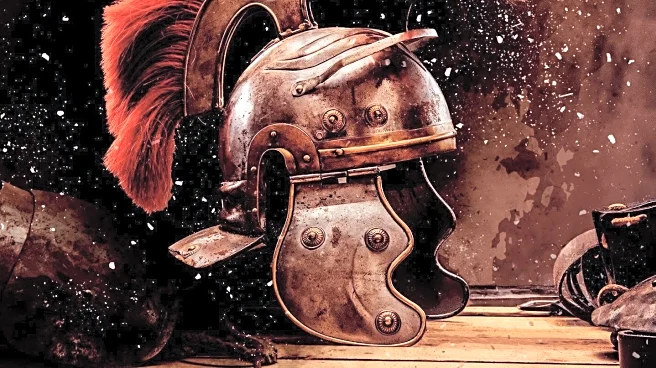What's Happening?
Archaeologists have identified seven fully preserved skeletons found in the ancient city of Mursa, modern-day Croatia, as Roman soldiers who lived approximately 1,700 years ago. The discovery was made in 2011 during an excavation of a water well that
had been repurposed as a mass grave. The skeletons, belonging to taller-than-average adult men, were found in various positions and depths, suggesting they were buried simultaneously. The researchers, from various European archaeological institutions, believe these men were likely soldiers involved in a battle for the city in 260 C.E. or a subsequent skirmish. The remains showed signs of early-life stress and injuries consistent with combat, such as blunt-force trauma and puncture wounds likely caused by weapons.
Why It's Important?
This discovery provides significant insights into the military history and daily lives of Roman soldiers during the Crisis of the Third Century, a tumultuous period marked by civil wars and foreign invasions. The findings highlight the strategic importance of Mursa as a trade and military hub in the Roman Empire. The analysis of the soldiers' diets and origins, through carbon and nitrogen stable isotope analyses and DNA testing, reveals a diverse composition of the Roman military, with soldiers originating from various regions, including northern or Eastern Europe and the Byzantine Empire. This underscores the extensive reach and integration within the Roman military system.
What's Next?
Further research and analysis of the site and remains could provide additional insights into the historical context of the Roman Empire's military operations and the socio-economic conditions of the time. Continued archaeological exploration in the area may uncover more artifacts and remains, offering a deeper understanding of the region's historical significance and the broader implications of Roman military strategies and their impact on local populations.
Beyond the Headlines
The discovery also raises questions about the ethical considerations of excavating and studying human remains, particularly those from ancient conflicts. It highlights the importance of preserving historical sites and the need for careful documentation and respectful treatment of archaeological finds. The study of these remains not only contributes to historical knowledge but also prompts discussions on the cultural and ethical responsibilities of modern archaeology.


















